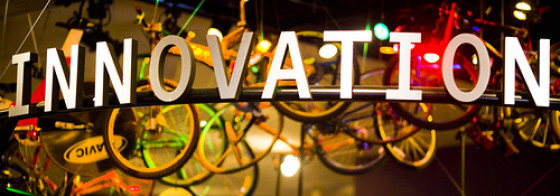
Be Loud, Innovate
“Keep your comments to yourself!”
Although now it’s hard to admit, I was a loud mouth at school.
I remember at middle school being sent outside the classroom for smart aleck comments.
This didn’t happen every once and a while but several times a week.
Just to be clear, I don’t think I was ever a bully and I never really got into too much more trouble than that. But, truth be told, I have always had a hard time keeping my ideas to myself.
I liked being heard.
Why do we keep our thought’s to ourselves?
Every since school you have probably either been punished or witness someone like myself being punished for speaking out. This carries through to college where you are taught that original ideas need to come from someone with authority. Maybe, a university professor or a establish professional. You get merit for successfully recalling and applying knowledge and often discredited for finding shortcuts or alternative methods.
This conditioning has a purpose.
If you’ve made it through school and university you’ve had to navigate many challenges and gained many insights and applicable skills. Not to mention a qualification to add to a resume. You’ve hopefully managed to evade crime and become a contributing member of society.
Does following the rules allow for personal growth?
Because of my early rebellious tendencies I have always overrated authority and continued to speak my mind. As I have aged, I have added the crucial step of first thinking before speaking and acting. However, I still don’t hold back. The effect has been that I have made many mistakes. I have exposed myself to failure more than most, and have been blessed with the opportunity to learn from those mistakes.
The School of Hard Knocks
These mistakes have not been particularly large but I mention them here because they have still exposed my ideas and given them the opportunity to fail. Failing is a blessing. It offers you the opportunity to gain unique insights that you can carry forward into your life. Taking on challenges and expressing new ideas do not always have a large risk associated with them, but in order to learn from failure you must welcome new challenges and get your ideas out there.
Scientists aim to prove assumptions and theories of the physical world. It is the assumption or the thought that is the idea. The experimentation is the exposure of that idea that gives it the opportunity to fail and learning to occur in the process.
Think, Experiment, Learn…
What comes first?
Learning or success/failure?
The answer is neither.
Everything starts with thoughts.
This is how we use the scientific method. We have an assumption or theory, we experiment to test the validity of that idea then we learn from success and most importantly failure. Then we recycle, tweak the assumption with our new understanding from the learning process.
Entrepreneurs are the scientists of customers.
Ever wondered why most startups fail yet some entrepreneurs are able to launch multiple successful ones?
It’s because of learning. However, it is not only learning but also where you choose to learn.
An entrepreneur looks to prove a business assumption that is some sort of need or want of a consumer. They have a creative idea of something that offers value. A solution for a customers problem. The assumption is that the customer has that problem and that your solution provides value to them by solving it.
You can see where this is going right?
The next step of course is experimentation but most entrepreneurs do this step wrong. Just like a scientist an entrepreneur needs to use testing to gain the learning necessary to have a break through. Instead, it is not the entrepreneurs product or service that should be tested but first the original assumption of customer value. Finding out what a customers real problem is. This is the key to solving it.
Makes sense when you look at it this way huh.
The entrepreneur has one more assumption to make, he must look to prove the possibility of business opportunity. Once the customer value has been validated by customer feedback then how to solve that problem profitably (or at break-even for non-profit) may be considered.
So the loud mouth entrepreneurial assumption here is assuming what customers really want and need. You can decide to expose that assumption to the experimentation phase before development or afterwards. Its really up to you as an entrepreneur.
But, where would you like to fail.
Would you like to learn from the school of hard knock at the conceptual stage of a business?
Or once you have sunk a considerable amount of time, effort and money into the development of a solution?
Startup testing and learning
Step 1: Test the assumption of customer value
If you’d like to be bold and propose an innovative solution or business proposal start with test the first entrepreneurial assumption. You can do this by getting outside and talking to customers, gaining feedback and quickly adjusting your assumptions accordingly. If you get it wrong, great! You have gained a unique insight that will give you an unfair advantage to offer a valuable solution.
Step 2: Test the assumption that your solution offers value
Then after much testing, feedback and learning you can then start to work on refining the valuable solution that you have created. You must find out if your solution meets the real and validated needs of your customer. You must also check to see if they are willing to pay for it.
Step 3: Can you make a business from it?
Now that you have a validated customer need and a product they will buy the next step is to ask if you can build a business around it. Can you offer your solution at a price customers will pay that will offer long-term profitability.
You can apply this method to reduce the uncertainty of business. Starting a business is never going to be a fool proof process, far from it. But you can be smart and set up the game so you can be succeed from learning rather than failing from guessing.
Remember the first step is to be bold.
Don’t hold back on blurting out that creative idea. You are better to get it out. There is no prize to an entrepreneur that doesn’t expose himself to the opportunity to fail. From idea exposure be sure to learn from feedback the same way you would in a lab. Feedback here is customer opinion, every other opinion is pure assumption. Remember this, and most importantly remember to be smart about where you decide to risk your boldness!
Become an ECO founder
Start the 30 day ECO founder Challenge (it’s free!) to learn how to startup your own clean technology business.
No spam, ever. You can unsubscribe at anytime.



Pingback: Book Review: Clean Tech Nation | Eco Founder()
Pingback: Don't Create Technology! Create Products - Eco Founder()